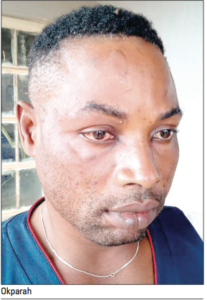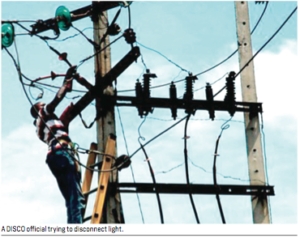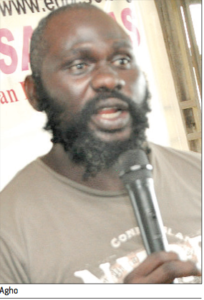Looking at Mr Innocent Okparah, as a smile lights up his handsome fair face, it is hard to imagine that just some months ago, he was battling to stay alive in the hospital.
But that was exactly the case. For almost two weeks, Okparah danced between earth and the great beyond.
But he is now full of life.
Okparah pulled up a chair, sat down and looked straight into the eyes of Juliana, our crime journalist. His smile slipped as recollections flashed through his mind.
Settling further into his chair, he recounted his bloody encounter with the Americans and military men, saying: “I was beaten with guns, boots and fists. It was just too much for me. I couldn’t fight back. They overpowered me.”
Okparah may have forgotten many unpleasant events, but he will never forget the day armed soldiers – allegedly working for the Benin Electricity Distribution Company (BEDC) – gave him the beating of his life.
The assault intensified after Okparah attempted to use his smart phone to take snapshots of the soldiers and BEDC officials. For his temerity, he had to spend weeks in the hospital fighting to live.
Aside from Okparah, other victims have also claimed to have experienced the same encounter with soldiers and white men. BEDC officials also tried to disconnect the power supply to their homes.

Despite sounding irrational, the beatings were discovered to be over the struggle for possession and ownership of electrical wires, ladders, power disconnections and estimated billings.
Consumers wanted their electrical wires handed back to them after they were disconnected, insisting they had purchased them. However, the BEDC refused to release the items.
For many Nigerians, it was abnormal to see DISCO officials, armed soldiers and white men coming to disconnect power supplies , but residents of Benin, Edo State, alleged that it was an everyday occurrence, which they had now got used to.
The acronym DISCO refers to electricity Distribution Companies in Nigeria.
Our correspondent gathered that many electric consumers are petrified of going to the media, fearful that the soldiers might pay them an unscheduled visit.
This was even after human rights activists dented the trend after ferociously fighting against such practices.
Recalling the encounter, Okparah said: “We had been hearing about it, but that day was my first experience. The BEDC officials came with military men and white men! After disconnecting the light, we told them that we wouldn’t allow them to go with our wires.”
“Four Nigerian soldiers fought me. They tore my clothes, flogged me, used their boots on me and hit me with their guns. I resisted to an extent, but I finally succumbed because I couldn’t contend with the power of four military men, who were fully armed.”
Okparah added that the new chapter opened by BEDC was difficult and consumers couldn’t cope. He explained that BEDC was urged to return to the original operating system, but it allegedly refused.
He said: “They became mad and we joined in their madness, and then they brought soldiers. They disconnected our house, we told them no problem, but that the ladder and wires belonged to us. We bought them with our hard earned money. The only thing that belonged to them was the energy.”
Okparah disclosed that the fight with BEDC started in 2017 after a court case, where DISCO was instructed to stop disconnecting consumers until further notice. He said that BEDC failed to recognise and respect the judiciary, so consumers also decided not to obey and respect the company.
“BEDC was doing illegal billing. The court judgement was given in Lagos and we wanted them to adhere to it, but they refused. We decided to protest their billing system. We decided to pay what we feel we consumed. Most of us know our billings and nothing was removed or added in our electrical consumptions, so how come the billings increased?
“Assuming your bill before was N5,000(US$13) or N10,000 and you’re suddenly given a bill of between N30,000 and N45,000, what will you do?”
That was our case. Part of the court order was that if a bill is being contested, the consumer should be allowed to pay what he or she was being billed before.”
He claimed that some bills even surpassed the consumer’s rent.
Some apartments had bills that increased from N1,500 to N5,000 while the rent for the apartments cost N3,000.
He added: “The court asked them to return to the original billing system, but BEDC refused. While we were busy paying our normal original billing system, they were busy compiling their new system of billings for us, which we had earlier refused to pay.”
After Okparah walked out of hospital, he embarked on a quest for justice, supported by the Edo Civil Society Organisation (EDOCSO).
He reported the situation to the Nigerian Army, the Police and Nigerian Immigration Service (NIS). He demanded that the white men should be investigated for human rights violations and be repatriated.
Okparah shared that he filed a complaint against the soldiers at 4th Brigade of the Nigerian Army and also petitioned the Edo State Governor, Godwin Obaseki.

It was discovered that the white men were working closely with some DISCO officials in three different states. The soldiers were attached to the white men.
Okparah also learnt that the white men were in Nigeria under the United States Agency for International Development (USAID), under the Power Africa Project.
“We heard that another company brought them to Nigeria and the arrangement was that each white man should be escorted by two soldiers. So, they are now using those military men to molest people. We are law-abiding citizens because we obey the court order,” Okparah said.
“When the Army called me about the matter, they asked me if I wanted the soldiers to be sacked, I responded that they were my brothers. There was no way I could watched them being laid off just because they became stupid by obeying total strangers. The truth is that I expected the soldiers to realise that as Nigerians, we are all brothers,” said Okparah.
Shaking his head in disbelief, the man said that despite everything, BEDC’s crazy billings have not stopped.
The New Telegraph learnt that because of BEDC rights violations, human rights activists in the state teamed up and embarked on a series of protests, often staged at the front of BEDC’s head office in Benin, demanding that the firm and its Managing Director/Chief Executive Officer, Funke Osibudu, should go.
The Coordinator General of Edo State Civil Society Organisations (EDOSCO), Leftist Omobude Agho, also had an encounter with the soldiers, white men and BEDC officials.
Agho said he received a call that power to his apartment was about to be disconnected and immediately rushed over to his community, to find out what was going on.
He was shocked to see armed soldiers, white men and BEDC officials.
Agho said he initially tried to reason with the delegation, but the situation soon snowballed when he was barked at and ordered to sit on the ground.
He was speechless with outrage. The incident occurred on Medical Road, Benin, where Agho lives.
He said: “I was in the middle of the meeting when I received a call that some white men and soldiers were at my house and wanted to disconnect my light. They said that I owed electricity bill.
“When I got there, I was annoyed. I went to meet the sales manager of BEDC, later identified as Mr. Ayiayi, who was also there. I asked what led to white men, who are foreigners, coming to our land with soldiers to harass us. He said that he was sorry; that the white men were from BEDC headquarters.”
“I was still speaking with him when one of the soldiers pointed his rifle at me and asked the sales manager if I was the one. The next thing I knew, the soldier placed the nozzle of his rifle at my chest and ordered me to sit on the ground. I didn’t know if the gun was corked or not.

According to Agho, when he started writing petitions against the military men and reached the DSS office, the DSS boss said his men were not attached to BEDC.
Agho said that although he had heard of such incidents, his own experience was an eye-opener. Armed with this experience and knowledge, he petitioned the Nigeria Police Force, DSS and Nigerian Immigration Service, to call for thorough investigations of the activities of the white men.
“Initially, we found such stories hard to believe until it came to our doorsteps. Nobody had been brave enough to take snapshots of them in operation. Mr. Innocent Okparah who tried it was almost killed. The soldiers and BEDC workers do not want to be captured on video or picture. Okparah spent two weeks in the hospital.”
Agho said that customers’ challenge with BEDC was not getting better, with everyone angry and the atmosphere tensed. According to him, Edo State indigenes no longer want the contract of BEDC to be renewed.
Agho, who said that the only solution to such human rights abuses was for the revocation of BEDC’s licence, added that opportunity should be given to someone, serious about providing power supply to take over.
Mr. Kelly Osunbor Omokaro also has a story to tell, but not as shocking as that of Okparah and Agho.
Omokaro explained that he was able to achieve peace, because of his vast experience in working with security agents and understanding their minds and psychological dispositions. The incident occurred at Oko GRA, Airport Road, where Omokaro lives.
He said: “The time was about 11am. I was at home when I heard my security guard knocking at my door. I opened my door and saw BEDC officials standing at the gate; I went out to meet them. I noticed that two soldiers and some policemen were with them. The policemen were not in uniform. They said we bypassed our meters.”
“On that day, they asked why my meter was bypassed. A BEDC lady led the delegation, but a soldier was the person asking questions. They were 13 people, including soldiers, policemen and BEDC officials.
“I explained about the court injunction on ground. I presented them with a copy of the court’s judgement and where BEDC was asked to revise the N13.50k, which they added on the tariff. Before increasing, BEDC was supposed to call a meeting where we discuss and negotiate the price increment. Thus they failed to do so and refused also to obey court order.
“If I was not well-grounded with the rules and regulations of the military, I would probably have started shaking and begging at the sight of the military and other uniform men.”
Omokaro said that he knew and had cordial relationship with some military commanders in the state. He said that when the soldiers noticed how he spoke, they were taken aback.
They soon relaxed their hostile stance.
The soldiers decided to return to BEDC office, insisting that Omokaro made a lot of sense with his argument.
“Four Nigerian soldiers fought me. They tore my clothes, flogged me, used their boots on me and hit me with their guns. I resisted to an extent, but I finally succumbed because I couldn’t contend with the power of four military men, who were fully armed.”
According to Omokaro, the Edo State people’s argument is that before such increase, BEDC should call a stakeholders’ meeting.
He said he went to BEDC headquarters to register his displeasure and renew argument, where some of the staff he meant on the ground told him that some of them were even suffering more than the consumers because, “their salaries had been slashed with almost 70 per cent.
They said that their welfare was now quite poor compared to the era of Power Holding Company of Nigeria (PHCN) and the National Electric Power Authority (NEPA).”
Omokaro said that he made efforts to report the soldiers and also to find out about their connection to BEDC. But the Army in the state only promised to look into the matter.
He said that even BEDC’s MD, Funke Osibudu, had military details attached to her. He said that Osibudu was the owner of BEDC and actually did buy it from the government.
“She is guarded night and day by soldiers. She stays at Protea Hotel in Benin. Go there right now; you’ll find soldiers everywhere. Even if you go to BEDC headquarters, you will see soldiers there. According to our law, the only person entitled to be guarded by soldiers is the Nigerian President. Even the Edo State governor is not guarded by soldiers. He is only guarded by police and DSS operatives. But to be guarding a private citizen, even down to the hotel she stays is against the law,” Omokaro fumed.
He added: “If you are spending more days in Benin and move around, you will hear a lot of stories. The major problem is that because soldiers are involved, victims shy away from speaking out. They are all afraid.”
The Public Relations Officer (PRO) of EDOCSO, Comrade Osazee Edigin, said the fight against such rights violations by BEDC had been on for years.
He remembered that on December 25, 2015, BEDC officials with soldiers went into a community at Country Home Road, off Sapele Road and attempted to disconnect the community transformer because some people owed electricity bills.
Edigin noted that the BEDC officials stormed the community in two trucks filled with soldiers. The disagreement was over estimated billing.
On August 15, The New Telegraphs’ correspondent, Julia Francis, went to the BEDC headquarters to see Osibudu, but the effort was futile. She was directed to the Assistant General Manager (AGM), Corporate Affairs Office.
At the BEDC headquarters, there were three soldiers in full uniform. One of them, patrolling the outside perimeter of the building, was armed.
The Head of Public Affairs, BEDC, Mr. Tayo Adekunle, was not around, but Mr Ibeh Odoh, his assistant, attended to the Julia.
Reacting to allegations that their company uses soldiers to harass, intimidate and brutalise energy consumers, among other atrocities, Odoh said it was a pack of lies.
He said, “ Those white men are USAID members working with BEDC. They are not our staff; they are more like technical partners, under USAID Power Africa Project.”
When asked why BEDC officials in company with the white men and soldiers struggle for possession of electrical wires with their consumers, Odoh explained: “We collect the wires to discourage customers from reconnecting illegally. Before we embark on disconnection, we usually give first, second and third warnings.”Speaking further on soldiers brutalising customers, Odoh said: “If there are victims, let them come to our office to complain and we shall carry out investigations.”
The New Telegraph’s correspondent also contacted the US Embassy, Lagos to question it about the allegations of human rights violations.
On September 5, she contacted Mr. Sani Mohammed, Senior Information Specialist, US Embassy, Public Section, Abuja.
He replied the following day, asking for further information about the journalist and the story she was working on.This information was provided and emailed to him.
However, as at the time of filing this report no response has been provided.
This story is a compilation of articles from Oct 18, 2018 to Oct 25, 2018.
BEHIND THE STORY
The story is about the energy crisis in Nigeria with special focus on victims of the Benin Electricity Company (BEDC), a firm that handles power distribution in Edo, Delta, Ondo and Ekiti states. The report detailed the pains of the consumers in the hands of BEDC using the military to intimidate and brutalise them. New Telegraph’s Crime Editor, Juliana Francis, who went to the Edo State to speak with the actors involved. The saga began after a court case in 2017, where DISCO (electricity Distribution Companies in Nigeria) was instructed to stop disconnecting consumers until further notice. The BEDC failed to recognise and respect the judiciary, so consumers also decided not to obey and respect the company. After the publication of the report, the Edo State governor, Mr. Godwin Obaseki, openly decried the capacity of the electricity company. Also, the Benin traditional leaders have visited President Muhammadu Buhari to make similar complaints. Already, BEDC have told electricity consumers that it is working hard in addressing the challenges. However, no punitive measures have been taken against the soldiers used to deal with the electricity consumers. The Vice President, Prof. Yemi Osinbajo, has declared that the electricity firms lack the capacity and infrastructure to provide power supply to Nigerians. Consequently, the Federal Government has vowed to look into the entire privatisation process.




